Sarahbeth Caplin's Blog, page 39
January 11, 2016
When luck smells miraculous (maybe)
After I got that nice refund check from CSU and paid for my new brakes, my clutch gave out as I drove 45 miles an hour on my way to church; ten miles over the speed limit, since I was late (I know, irony). I could feel the pedal getting “squishy” (it’s difficult to describe unless you’re familiar with the workings of a stickshift) and my engine roared as I stepped on the gas but didn’t move any faster. I finally came to a stop just as I pulled into the church parking lot. I didn’t make it far enough to park in a proper spot, and ended up awkwardly blocking the center aisle of the lot, but I was much safer there than I would have been on the road. I don’t want to think how this could have played out if the clutch gave out while driving much faster on the highway.
For all the complaining I do about the claim that “God provided for me,” the timing of the check and vehicle malfunction is coincidental for sure. As cynical as I’ve been, it was difficult not to consider the possibility that God was trying to get my attention. Like he was doing everything short of slapping on a billboard, Here I am! I’m real, I care! What more do you want?
Perhaps I’m being a hypocrite for not believing that. These stories of divine intervention would frustrate me less if I had verifiable proof they were divine, right? The person telling the story couldn’t be accused of arrogance if she was actually telling the truth.
Still, I am left with the question of “Why me?” Not that I take issue with miracles happening in my life, but I’m not someone who really needs one, financially speaking anyway. I’m not rich by American standards, but I am compared to the way the majority of the world lives.
The clutch giving out in the church parking lot is a bit harder to explain away, since that could have been a matter of life and death if it happened somewhere else. But then I think of how many people have perished in car accidents. I can’t ever claim “God saved me” without feeling guilty about those who weren’t.
Why can’t I just be happy for people who direct their gratitude to God? Why can’t I just be happy that they’re happy? Maybe a few years from now, when my wounds are not so raw, I will get there. Maybe the time will come when I’ll stop taking comments expressed in pure joy so personally.
As for my own experiences, the best I can offer is maybe it was God, but maybe it wasn’t. I don’t believe in luck, but I believe in chance.
Once again, my best answer is simply “I don’t know.”
Filed under: Religion Tagged: Christian culture, Christianity, evangelicals, First World Problems, grief, prayer, prosperity gospel








January 7, 2016
What changed my mind about intercessory prayer
This week I found out my car needs new brakes. New brakes – front and rear – cost about $800. I don’t have $800 (well, I do, but I’d have to take it from the Future House fund, and I really didn’t want to do that).
But then I checked the mail, and found a refund check from Colorado State for $9900 – money left over from the loan I took out expecting to have to pay out of state tuition again, before my petition for residency was approved.
Long story short, I was able to buy new brakes. And another bag of prescription cat food for my cat with food allergies. And pay rent.
If I posted this story on Facebook and concluded with “God is so good!” I’m sure it would have easily gained 50 or more “likes.” But I’m not going to do that.
A friend of mine who writes for Patheos shared this photo recently, and it’s haunted me ever since.
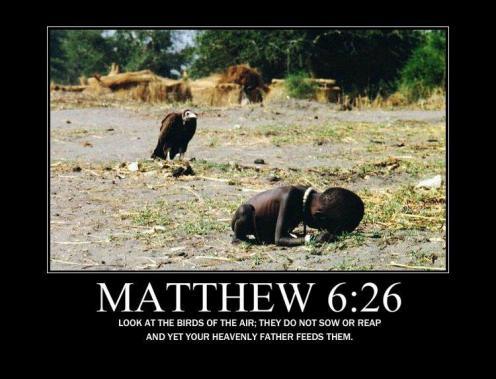
I’ve seen the photo before, but the caption from the Bible with it is especially gutting. I have no idea what to say to people as hungry as that child was, as far as God’s provision for their needs. The thing is, even without that check, I could have paid for the brakes out of my savings, and I wouldn’t have had to sacrifice a few meals to make up for it. At worst, Josh and I wouldn’t be able to have Date Night at a nice restaurant (read: Buffalo Wild Wings or Texas Roadhouse) for a while. Well, more likely, we’d have to extend our lease for another few months and Josh would take more shifts at work until we could afford a down payment for a home and still have money left over to eat and stuff.
The point is, of all people with needs, I could have gone without that check. The timing of it is coincidental, yes – but I’m not “needy” in the truest sense of the word. Honestly, I’d feel guilty claiming God’s blessed me for something that is rather trivial in the grand scheme of things.
It’s for this reason that my beliefs about intercessory prayer are changing. When I see God helping people who already have more than most, I get skeptical. The photo of that starving child does not jive with my idea of a loving God, because I can’t reconcile a loving God who favors the privileged (I also don’t believe that self-protective prayers are biblical, but that’s another post). When I think of the verse quoted in the picture, I imagine – though I could be completely wrong – that it refers to the resources on earth that humans need to survive: edible plants and animals, clean water, tools for building shelter and healing diseases. The problem is humans who don’t want to share those things.
I can’t help but agree with the blogger who wrote this:
The minute you broadcast that good fortune as divine blessing…you are convinced at some deep level of God’s special favor. In proclaiming this good fortune, you are also calling into question the status of everyone else. When you celebrate even the most amazing occurrences – successfully overcoming cancer, surviving a tornado, or a sudden and unexpected financial windfall – you are suggesting those who are dying of cancer, killed in the tornado or poor and destitute are less favored by God. Your prayers were answered, but not theirs.
This is exactly how I felt reading posts on Facebook praising God for healing someone’s cancer after my father died. My faith was already struggling, and while the authors of such posts probably think they are being encouraging, they’re not. At least not to me. They mean well, sure – but ultimately these sentiments are just not helpful for people who didn’t get a “yes” to their prayers.
It’s more comforting for me to accept that we live in a fallen world in which shit happens to the just and unjust alike. Sometimes we understand the reasons – bad genes, poor decisions – but often times we don’t. I find greater hope in redeeming tragedies than seeking to prevent them. If I’m ever killed in a tragic, unexpected accident, I hope my organs can go to a child who needs them, so at least the tragedy will mean something to another family. That’s different than saying I had to die so another child could live, but I think God is in the business of redemption. Making beauty out of broken things.
Filed under: Religion Tagged: cancer, Christian culture, Christianity, Controversy, evangelicals, Facebook, First World Problems, grief, prayer, prosperity gospel








January 6, 2016
Crafting as a form of self care
Elizabeth Esther wrote a great blog post about the importance of “impractical” creative expression. For her, that involved learning to sew Victorian-style dresses, allowing her to indulge her childhood dream of becoming an actress – something she was forbidden to pursue (if I had that kind of sewing talent, I might invent excuses to wear them, like having friends over for high tea or something).
For me, crafting is also a form of self-care. Reading and journaling are great, but every writer faces the difficulty of putting words to certain images or emotions. That’s where art comes in handy, since pictures, they say, are worth a thousand words.
For this reason, I don’t mind when magazines have a ton of advertisements. They come in handy for making collages.
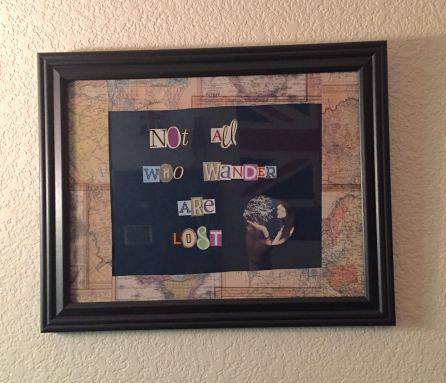
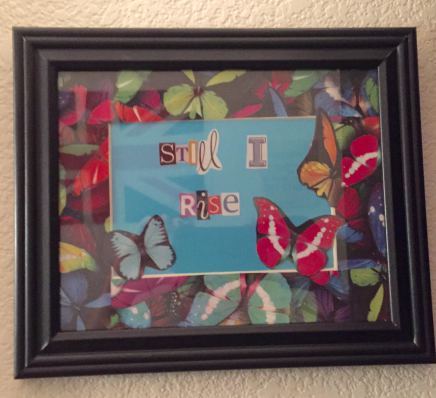
Working with my hands helps me accomplish what my counselor calls “staying present.” I wonder if this is part of the reason that Orthodox Jews pray with tefillin and Catholics pray with rosaries: having something tangible to look at and hold helps keep the focus on the task.
“Staying present” is exactly as it sounds. It’s the opposite of mentally slinking back into the past, where trauma lives. There are times when writing becomes mentally exhausting and emotionally draining. While collages get hung up on my wall or put in the Future House box in a closet, I’ve come up with another way to craft positivity. A craft small enough to take with me anywhere.
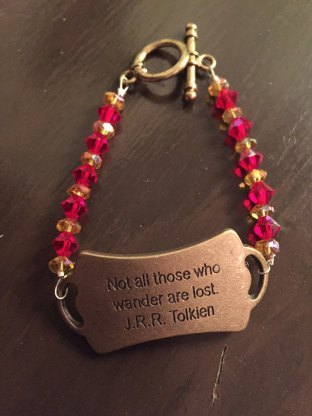
But not all of it is inspirational. Some of it is just fun.




I learned how to make jewelry when I worked at the YMCA of the Rockies for a summer a few years ago, and kept teaching myself after the season ended. My husband bought me a bead book for my last birthday, so I’ve been extremely busy since the fall semester ended – so much that I made enough earrings for every woman in my church’s young adult group (about thirty). My fingernails are frayed and the skin on my fingertips is torn up, but I get joy out of making things for other people (heads up if you’re female and know me in real life: you’ll be getting jewelry from me for every birthday and Christmas for at least the next five years).
Eventually I started running out of space for finished projects, even small ones like earrings and necklaces (yes, believe it or not, a woman CAN have too much jewelry). Since we’re hoping to buy a house at the end of this year, I’ve told Josh I can hold off buying more bead stuff for a while. I said I could try to find a less expensive and space-occupying hobby, but I’ve relayed the whole “being present” message to him many times, and he knows that crafting helps with that. Plus I enjoy doing it. Well, that, and I got an order for $80 worth of merchandise on my Etsy shop just before Christmas, so there’s another incentive.
Sometimes, the things that give us joy don’t have to be practical. At some point, mine may no longer be affordable, but luckily I’m not at that point yet.
Filed under: Other stuff Tagged: Christianity, depression, grief, Judaism, self-care








January 1, 2016
Theme for 2016: be surprised
 I learned a long time ago that “resolutions” for the new year are kind of pointless. “Resolution” sounds like “promise,” and breaking a promise invokes all sorts of judgment – mostly from myself. So I have more of a theme for 2016. We’ll see if that works any better (though I briefly considered making “take less selfies with my cats” a resolution…but let’s not get crazy).
I learned a long time ago that “resolutions” for the new year are kind of pointless. “Resolution” sounds like “promise,” and breaking a promise invokes all sorts of judgment – mostly from myself. So I have more of a theme for 2016. We’ll see if that works any better (though I briefly considered making “take less selfies with my cats” a resolution…but let’s not get crazy).
My theme is pretty simple: be willing to be surprised.
I was talking with a friend this week that I look to as sort of a mentor. She already wrote a blog post on the idea of “Christian agnosticism” before I thought to bring it up in conversation. I loosely define that expression, oxymoronic as it sounds, as someone who believes in Jesus but doesn’t understand much of anything else pertaining to the Christian faith. I have an unsettling feeling that this is the uneven ground I’ve landed on, and may be camping out here for a while…or maybe I won’t. I want my faith to still grow. I’m willing to be surprised.
I have this dichotomy in my head of Safe Christians and Unsafe Christians. The “safe” Christians are the ones who listen without judgment, and may disagree with me on many levels, but seek to understand. The “unsafe” Christians are the ones who judge, condemn, and berate anyone who believes differently than they do. I’ve formed ideas of who in my church is “unsafe” and it has occurred to me that those judgments could be completely off base. So I’m willing to be surprised.
For the last several months, I’ve been afraid to open my bible, afraid of having anxiety triggered by what I read in there. But, I’m willing to be surprised by the content once again. Surprised, enlightened, who knows…I’ll aim for “surprised,” for now.
As for prayer, that, too has gone by the wayside. I’ve given up on praying for things beyond my control, knowing God has a plan that’s going to happen regardless, so what is the point? At the very least, I need to get back to writing in my prayer journal, even if it’s mostly rants…and be willing to be surprised.
What about you? Is there anything you hope to be “surprised” by this year?
Filed under: Religion Tagged: Christian culture, Christianity, Writing








December 31, 2015
Top ten most popular posts in 2015
 The way I measure “popular” is by interactive discussion threads, not so much number of ‘likes.’ Liking a post is easy to do, but the true value for me is reading comments of people who were moved by what I wrote, even if they disagree with my conclusions. Without further ado…
The way I measure “popular” is by interactive discussion threads, not so much number of ‘likes.’ Liking a post is easy to do, but the true value for me is reading comments of people who were moved by what I wrote, even if they disagree with my conclusions. Without further ado…
10.‘Fifty Shades’ and pornified rape victims
9. Wil Wheaton: ‘You can’t pay rent with unique platform and reach’
8. When God talks like an abusive boyfriend
7. What Judaism taught me about gay marriage and persecution complexes
6. #SolidarityWithStoya: What the Church can learn from the porn industry about consent
5. When church triggers anxiety
3. Does Jesus really make people “better”?
2. Checking reason at the door: Ken Ham and the fear of contradictory evidence
1. I’m pro-life and I don’t support defunding Planned Parenthood
Filed under: Feminism, Rape Culture, Religion, Writing & Publishing Tagged: Abortion, Answers in Genesis, Christian culture, Christianity, Controversy, depression, evangelicals, Feminism, Fifty Shades of Grey, gay marriage, grief, Judaism, Ken Ham, LGBT, Pornography, rape culture, self-publishing, Spiritual Abuse, Writing








December 28, 2015
Confessions of a convicted cherry picker

Those are just the cherry on the sundae, as it were. Since we’re talking about cherry picking, after all. You’re carving out maybe 10% of the book to keep as the basis of your beliefs.
Can you share for us perhaps your best reason you, as an obviously rational person and adult, bought into what seems so clearly to me, anyway, to be no different than countless other religious myths? And is that reason based on hard evidence that you’ve investigated and concluded was worthy of accepting as true?
Those are just two responses to my comment on my friend Neil Carter’s blog post, a chapter-by-chapter review of The Reason for God by Timothy Keller. The specific chapter in his most recent review had to do with Keller’s explanation of why we can trust the Bible’s authority, and the issue of how to deal with passages that go against our progressive cultural values. I wrote:
Years ago I met someone at my church who said he was an atheist who wanted to learn more about Christianity. I asked him if he was considering converting, and he said something to the effect of the Bible being too bogged down by rape culture and violence and harmful teachings for him to ever call himself a Christian. Fair enough. But I would say that while issues of evolution vs creationism, subjugation of women, etc, are all deserving of our attention, dwelling on that does take away from the (mostly) universal message of redemption that the gospel teaches. I would say to anyone considering conversion to focus on that, which is what keeps me in the faith, anyway.
Responses like the ones above are just a few objections I hear a lot. And my pithy retort, You want to know why I believe? Well, just read my book! is less than satisfactory. But I didn’t address the issue of “cherry-picking” much at all in that text, so I’ll address it here.
First of all, I think it’s safe to say that all people of faith cherry-pick. I don’t believe anyone who swears they don’t. We all have individual objections or criticisms of certain biblical mandates, and until Christians unanimously decide which ones were meant for a specific 1st-century culture and which are universal, we act as if they don’t exist…until someone outside the faith brings them up.
Maybe this is hypocritical of me, but I don’t think making a conscious choice to focus on Jesus falls under cherry-picking. I would consider it an act of prioritizing, not unlike Jewish people focusing on the story of Exodus over the purity laws of Leviticus. Why? Because the story of the Israelites’ slavery and exile in Egypt is the core of the faith, upon which all denominations are founded on. That is what I like to think connects all people of the Book, regardless of whether they are Orthodox, Reform, or somewhere in between. In the same vein, what Christians believe about Jesus far outweighs the debate about how humans were created, how the lions were kept away from the gazelles on the ark, or whether homosexuality is really a sin. Those issues matter, but are not what I consider “center stage.”
As to my “buying into myths” as a rational adult, that gets trickier. I’m reminded all the time at church that my testimony is mine and can’t be disproved, but to the skeptic, I know it isn’t satisfactory. My story is not one of studying evidence and finding it so compelling I had no choice but to convert. I have to agree with pastor Andy Stanley, who said in a series of sermons on adult conversions, that most adults convert for emotional reasons over factual ones. I know that statement will lose many people, but it’s the truth.
To answer that question of why I“buy into those myths,” I’d have to go back to childhood where I always believed in some form of a higher being, but felt frustrated that the Jewish version wasn’t very accessible – he seemed far away and difficult to grasp, whereas Jesus was a human my friends could talk to and hang out with. I’d have to go back to high school when I met my friend Tricia, whose faith was truly lived, not just spoken about, and made such an impression on me that I had to ask her how she got it. I’d have to go back the dark days of living in an abusive relationship with someone who convinced me over a period of five years that I was worth nothing.
I’d have to recall the message I heard about God redeeming broken things during a Campus Crusade for Christ meeting a friend convinced me to attend with her. And I’d have to explain how that message saved my life on the few occasions I sincerely contemplated suicide: all my childhood heroes (Joan of Arc, Cassie Bernall, Anne Frank, Queen Elizabeth I, Esther of the Bible, to name a few) overcame adversity to become extraordinary, and I wanted that to happen in my own life. The gospel message haunted me for years, to a point where I could no longer ignore it, and gave me hope when life became too difficult to bear without anti-depressants and alcohol (yes, I know, a deadly combination). I see Christianity as a journey of being refined through the “fire” of life’s tragedies, not as a defense mechanism against them, which is how much of America treats it. I see Christianity as an example of radical love and radical forgiveness, which is ridiculous as it is beautiful, but I think the ridiculousness is kind of the point.
Those are the reasons in one giant nutshell. It may not convince most people who hear it, but that’s not why I tell it. I only share it because it changed my life.
(And despite some spoilers, I do hope you still consider reading the book) :D
Filed under: Religion Tagged: Author Sarahbeth Caplin, Campus Crusade for Christ, Christian culture, Christianity, Confessions of a Prodigal Daughter, Controversy, depression, evangelicals, grief, Judaism








December 27, 2015
Bathsheba, justice, and the scandal of redemption

Photo credit goes to my husband, Joshua
What You Need to Know About Bathsheba was recently shared in the Progressive Christians Facebook group (of which I am a member even though I don’t consider myself a “progressive” anything). It’s a fascinating case for Bathsheba’s righteousness and heroism despite the shittiest of circumstances, and on some level it does give me hope. It also reminds me of the scandal of the Gospel that has given hope to so many: there is no past so awful that God cannot forgive and redeem. Having made my own share of mistakes, I’m grateful for that hope.
At the same time, I’m also deeply disturbed by it. It’s taken years of therapy and a few visits to AA to stop living my life in anticipation of an apology I knew all along I’d never receive. All the while, I have fought to comprehend a message that promises as much redemption to my own life as it does to my rapist. The same message that quite literally saved my life on multiple occasions also promises my ex boyfriend that he, too, can become reformed, forgiven, and start anew.
I can’t make any attempts at righteousness here. I have written in my prayer journal a handful of times, “God, I really think that’s bullshit.” Because however much a person has changed on the inside – and only he can know how genuine that is – it doesn’t eradicate the consequences of his actions. It doesn’t make the hurt his victims feel go away. I can’t lie about how much it disturbs me that God allowed a convicted rapist (morally, if not legally) be included in the lineage of Jesus.
I can’t help wondering how Bathsheba would feel if she knew that’s what would happen.
Who gives that kind of privilege to a person who has caused such pain – God, or a crazy person (or a crazy God)?
Would you let a convicted sex offender babysit your kids, after proclaiming till he’s blue in the face how sorry he is and how much he’s changed?
Would you let someone back into your life who has taken advantage of you too many times to count – stolen from you, lied to you, betrayed you – after the fifth, the tenth, the twentieth apology and promise that they’ve changed?
On some level, doing so would violate basic common sense, and cue that old saying, “Fool me once, shame on you. Fool me twice, shame on me.”
If it’s not already obvious, I want to point out that I don’t struggle with forgiveness or wanting redemption for the worst of offenders because I’m being vindictive. I struggle with all of that because I’m still hurt. My second memoir (which is in the revising stage) will expand on how this struggle to understand justice affects my faith, more than the first book did. That first memoir was how I found faith, and the next one is about the struggle to keep it, or let go of the harmful pieces and hang on to the good ones.
With barely a week left of 2015, I can only hold on to the hope that 2016 will bring new experiences that show me new wisdom and fresh chances to start over. In my heart I know the benefits of forgiveness: they are more for me than for anyone else. Forgiveness sets me free, but it’s still a big step, and I may not do it well for a very, very long time.
The holiday season is a painful time for a lot of people, many of whom have been hurt by their families or loved ones – maybe that includes you. I hope 2016 is a second chance for you as well, even if you’ve used twenty of them this year alone.
It’s funny how my career has been built upon challenging difficult doctrines, asking difficult questions, and publicly wrestling with doubt. But in spite of all that, I do want emphasize the piece that keeps me going, that I hope keeps you going: that redemption is possible no matter how much you’ve screwed up or been screwed by others. I still firmly believe that tragedy can be used for glory.
Filed under: Rape Culture, Religion, Writing & Publishing Tagged: Author Sarahbeth Caplin, Christian culture, Christianity, Confessions of a Prodigal Daughter, Controversy, Feminism, grief, rape culture, social justice, Spiritual Abuse, Writing








December 20, 2015
A year in review (of books): 2015
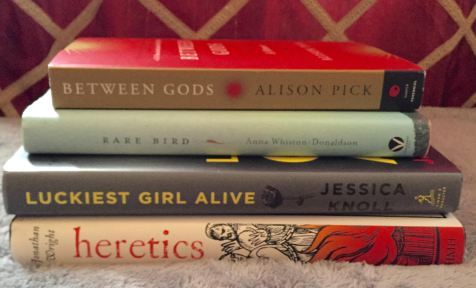
Reviews of 1% of the books I read this year:
The Luckiest Girl Alive by Jessica Knoll
Apparently my kind of “chick lit” is just as dark and thriller-like as the stuff I usually read. And I admit to being suckered in by the comparison to Gone Girl on the front cover, a habit I need to break. Seriously, not every book with a disturbed female character is like Gone Girl! I liked this book okay, but Gillian Flynn should be offended within every inch of her life if critics think Ani FaNelli is anything like Amy Dunne.
*end rant*
I figured the “secret past” would be disturbing, but there’s still plenty of fluff to cushion it (was the author paid by the number of fashion brands she dropped in this book?). I never quite warmed up to TifAni FaNelli, even after her secret, traumatic past was exposed. Probably because her name is TifAni FaNelli – seeing that name on the page was like a dagger in my eye.
Did you know that the majority of violence committed by Christians throughout history was against other self-professed Christians? Neither did I until I read this book, though sadly I’m not surprised. One can only imagine the struggle of living in a time when the “true” doctrine depended on who was currently sitting on the throne. This book is dark but fascinating in a can’t-peel-my-eyes-away-from-this-train-wreck kind of way, though it gave me some perspective on the current culture wars in America. Everyone, it seems, it considered a heretic according to someone’s theology. The best you can do is learn as much as you can with as much of an open and humble heart as possible. Definitely made me grateful to live in a time when my right to freedom of religion is protected.
Rare Bird: a memoir of loss and love by Anna Whiston-Donaldson
There’s been a trend of sad books this year, if you haven’t noticed: this is a memoir of a mother’s grief and struggle of faith after her twelve-year-old son died in a flood. I find solidarity in these kinds of books, especially when Donaldson recalled a conversation with a member of her church who encouraged her to “trust God’s plan” in the wake of Jack’s death. “Yeah? Well, what if I don’t like His plan?” is Anna’s deadpan response. And later she even says, “Fuck that plan.” Wow! You don’t see that kind of unbridled honesty in Christian books, and I loved it. Of course, that was the biggest complaint in most of the 1-star Amazon reviews, the author’s “unholy” language. Well, if your son was tragically killed, I think an f-bomb or two (or twenty) is perfectly acceptable. Anna’s struggle of faith in crisis is real, raw, and commendable.
Can’t say this book doesn’t have any unsavory material, either – the author is a descendant of Holocaust survivors, and plainly describes the horror many women endured in the camps, particularly by the “angel of death” Dr. Mengele. But those scenes are critical to the book because being a descendant of holocaust survivors has a huge impact on Alison’s Jewish identity. Yet she is not considered wholly Jewish in the eyes of the beit din because she is the product of an interfaith marriage. Our stories are different, but I could still identify with the struggle of wondering what it means to be “truly Jewish.” I found it ridiculous that Alison wanted to be a Jew so badly, but was continually denied by a technicality beyond her control. The most important thing I took away from this story is the reminder that while religious community is important, other people can’t define a spiritual identity for you. That is ultimately between you and God.
Other reviews of books read this year:
Defending Christianity: advice from an atheist by John Loftus
Filed under: Other stuff Tagged: Christian culture, Christianity, grief, Judaism, memoir








December 18, 2015
Don’t call me “progressive” (or “conservative,” either)
I am a moderator on my friend Neil’s blog, Godless in Dixie. What that means is that it’s my “job” to make sure everyone is behaving themselves in the comment threads – no name-calling, no mud-slinging, no trolling – and delete people who can’t be respectful. I am the only theist moderator, which could be either a badge of honor or a mark of shame, depending on who you ask. The community I’ve gotten to know there seems to like me enough because I’m a Christian without an agenda, and I admit when I have no answers to things (which is a lot). Other Christians might say I’m doing it all wrong because I don’t preach, despite the majority of readers being former Christians who have already heard apologetic rhetoric before, and found it lacking.
But one comment directed at me made me think twice about how I’m presenting myself: “Beth, I know since you’re a moderate Christian, you probably don’t believe in this theology…”
My hang-up is on the word “moderate.” Others use “progressive” or “liberal.” I don’t identify with any of these, and tend to eschew labels in general. But I also know the moment I express doubt about any standard Christian doctrine – hell, for example – I essentially put myself in the moderate, progressive, liberal camps (whatever you want to call them). By contrast, the ones who know it all, who see everything in black and white, get placed in the conservative, Right Wing camps.
These ways of classifying people are grossly unhelpful. I understand why we do it, and I’m guilty of it myself. I admit to tensing up when someone proudly identifies as a fundamentalist or evangelical, due to previous bad experiences within those groups. But I’m trying to stop.
I don’t consider myself “progressive” or any other synonym, so much as a seeker with a ton of questions. When it comes to troubling doctrines like hell, I may not like it, but I’m not tossing it out, either. It may likely remain in the “I’ll never fully understand this” theology folder, along with why homosexuality is considered sin, whether babies and people who never heard the gospel go to heaven, and why God lets 200 children die every day for lack of clean water, but goes out of his way to reserve parking spaces for privileged Americans.
That’s heavy stuff that deserves serious study. But none of that comes close to the point of Christianity as I see it. There’s a reason I’ve stuck around despite growing discomfort with right-wing rhetoric and “God says it, I believe it, that settles it” type thinking.
As much as I loved being Jewish, the message of the cross haunted me for years. I could not get this idea of a human god willing to suffer betrayal and pain and undeserved death out of my mind, nor the shedding of divine privileges to serve poor people and dignify prostitutes and point out glaring hypocrisy among those who only prayed in public to be admired for their faithfulness.
It takes a lot of effort sometimes to look beyond the ugliness of what has become a very American, very privileged picture of Christianity: a Christianity that blesses the rich and blames the poor for being poor; a Christianity with a persecution complex that looks for conspiracies everywhere. I abhor that kind of Christianity.
The kind that draws me in, that still occasionally fills my heart with wonder is the kind that is realistic enough to admit all people, in some form or another, will suffer – no one is immune from it, regardless of how faithful they appear to be. It doesn’t promise safety or protection, but does promise to redeem suffering somehow, which has helped me persevere in ways that words can’t do justice explaining.
It’s the kind that warns would-be disciples that the road of servanthood is anything but pretty, anything but comfortable. A Christianity that “saves” people from drunk drivers, suicide bombers, and incurable cancer is not compatible with Pick up your cross and follow me. It is my staunch, un-humble opinion that those who choose Christianity to be protected from those things are pursuing the wrong Jesus.
It took many years for me to understand this, after having lost a friend to suicide, suffered abuse, and watched my father die. It was not lack of faith that “caused” those things, but rather a consequence of living in a fallen world. Life is not fair, and life is not just. I can’t explain the ultimate purpose of suffering, of course. But it’s a lot easier to accept that it happens and try to make something of it, rather than pray to avoid it, only to get angry with God when the miscarriage happens anyway, when the car slides on black ice and hits a telephone pole – or something of the sort.
I don’t know whether all that falls under “progressive” or “conservative” or what – that’s for other people to decide. But that’s my 7-year-long journey in a nutshell, and by this time next year, I might have radically different conclusions.
*Edit: I just took this quiz that someone posted on Facebook, and apparently I’m supposed to be Anglican or Episcopalian. Make of that what you will:
“You should really be an Episcopalian! You’re a laid back Christian with a love for tradition and an especially open mind. You value the hierarchy of the Church and respect its authority but you want it to reflect the modern world. You appreciate ritual and respect a traditional atmosphere, as long as there’s room for everyone!
The Episcopal or Anglican Church started in the 16th Century with King Henry VIII’s reformation of the Catholic Church in England. Once he broke with the Pope in Rome, the Church became independent. While keeping many pre-Reformation traditions, the Anglican Church was deeply affected by the Protestant reformation. Most Anglican/Episcopal churches tend to look and feel traditional, but they’re known for being open communities.”
Filed under: Religion Tagged: atheism, cancer, Christian culture, Christianity, Controversy, evangelicals, First World Problems, grief, hell, Judaism, social justice








December 16, 2015
I used to think abused women were stupid
Today’s post is featured on Feminine Collective.

Photo credit Katie Tegtmeyer
I have a small degree of sympathy for people who judge women in abusive relationships. That’s because I used to be one.
I recall a Dear Abby column I read over my morning cereal about ten years ago, which I later vented to my mother about. A woman wrote to Abby for advice about her husband: a man who hit her, demeaned her, and used their savings to buy drugs. But she loved him; she wanted advice on how to still make their relationship work. Abby’s advice, I thought, was way too soft. She encouraged the woman to reach out to someone, to call a domestic violence hotline, and formulate a plan to leave this man who clearly did not have her best interests at heart.
Honestly, if I were Abby, I’d have responded with something like, “Lady, wake the fuck up. How dumb are you to still love this man? Just leave already! There’s plenty of men out there who will treat you far better!”
Now, of course, I realize it’s not that simple. Actually, it’s anything but simple.
I may not know what it’s like to be financially dependent on an abuser, or blackmailed and threatened with further violence if I contemplated leaving. My abusive relationship was nothing like that. But I do understand the emotional dependency, and the deep residing belief that you are not worthy of anything better.
My abusive relationship was a constant power struggle in which my boyfriend Jason always had the upper hand. I could never call him; only he could initiate the contact. I learned this when I called him just to talk, and he was annoyed to be pulled away from his friends. We couldn’t go out in public together because he didn’t want people to know about me (which I suspect was because he was a respected leader in his Catholic church, and I was Jewish). The few times we did venture out of either of our homes, he insisted I walk several steps behind him; he’d get angry if I asked him to slow down. When I ran into him downtown and tried to introduce him to a friend of mine, he spit out his gum, handed it to me, and said “Could you throw this away for me?” before walking away. When I called him later that night to reprimand him for being an asshole, he played the “I’m sorry I’ll never be good enough for you” card, and it was me who ended up apologizing profusely.
I honestly think that was worse than the sexual abuse, which happened later. I had no idea that acquiescing to repeated demands of “Come on, you owe me after I bought you dinner”; “You’ll change your mind when you see how good it feels”; “You’re just so hot, I can’t help but get carried away around you” and more was not enthusiastic consent, and therefore, rape. The thing was, he rarely pinned me down and physically forced me to do anything; that only happened twice over a span of five years. His ways were more emotionally manipulative, particularly his sneering reminder that no one would ever love me like he did.
It sounds ludicrous now, but he was my first love, my first serious relationship: I was eighteen years old and already wondering if something was wrong with me because I’d never dated before. Finally, I believed that our physical involvement outside of marriage meant that I was tainted, and ruined for any good man. I felt I had an obligation to stay and make it work. I thought marrying him one day would be the only way to rectify our sin, which I felt culpable for since I did lead him on with my tight jeans, after all.
When writing about a topic that many people misunderstand, there’s always something that gets left out, because I can’t anticipate every ignorant reaction from trolls who want to prove I’m just being vindictive. When it comes to rape and abuse stories, there’s just no satisfying everyone. Even if I were attacked at random in a park, someone will want to know the hour in which I was jogging (is it early morning or late evening that is considered The Raping Hour?) and whether I was wearing spandex. If my ex were an acquaintance at a party, people would want to know how much I flirted and how much I drank. Just when you think you’ve come up with a scenario in which abuse is indisputably the assailant’s fault, someone who wasn’t there and doesn’t know you will fight you on it.
“Innocent until proven guilty” applies to the accuser as well as the accused, yet domestic abuse is the only crime in which the victim is asked to prove she or he is actually a victim before the situation is taken seriously. Unfortunately, I had to experience it for myself to learn how wrong I was about abused women. For many people, that is the only way to be set straight, and that absolutely needs to change. No one deserves to live in such a way that undermines his or her basic human dignity.
If I ever met the woman who wrote the Dear Abby letter (and I’ve probably bumped into women in her situation more times than I want to consider), I’d tell her she is worthy of respect. I’d ask if there’s anything I could do to help her. And then I’d respect whatever amount of agency she has by allowing her to make her own decision about what’s best for her life.
Filed under: Feminism, Rape Culture Tagged: Feminism, rape culture, self-care, social justice











